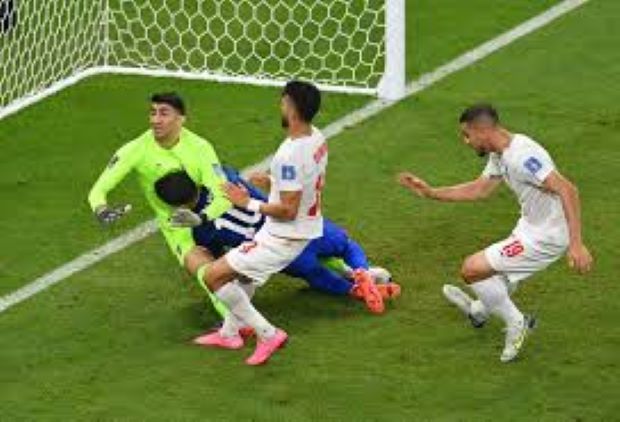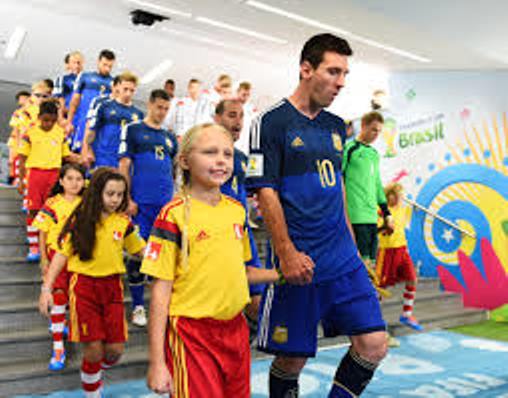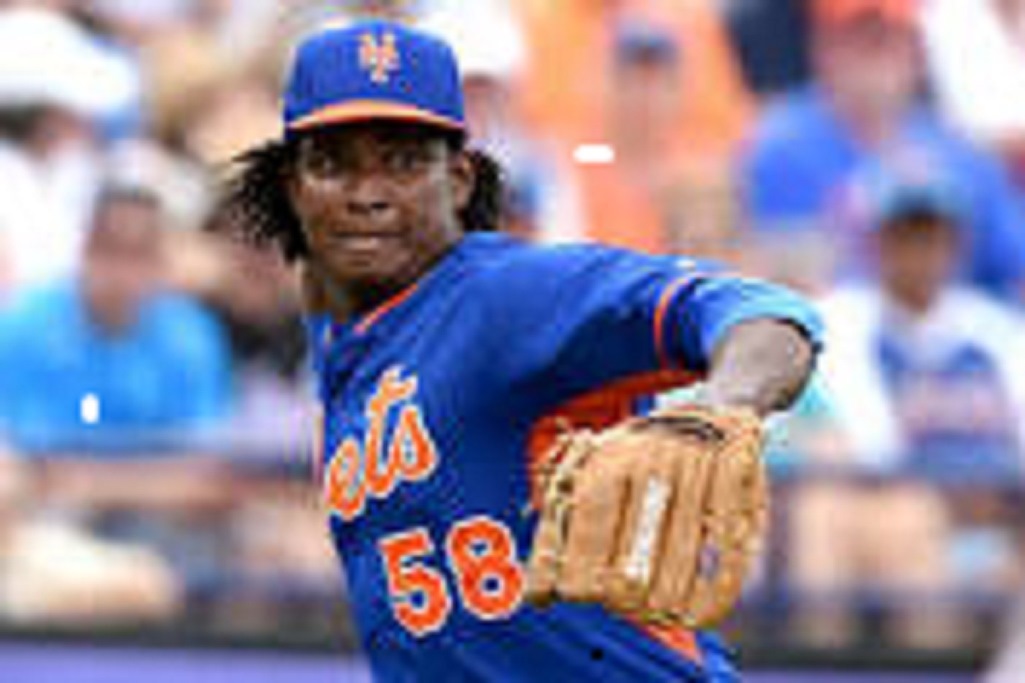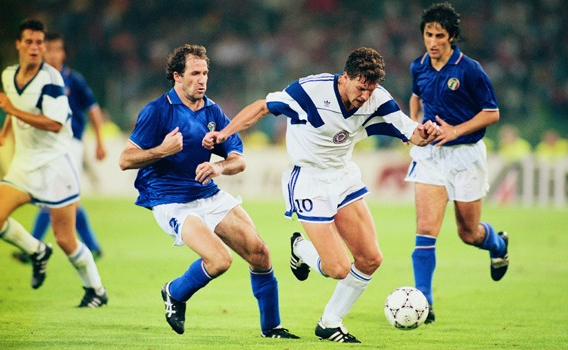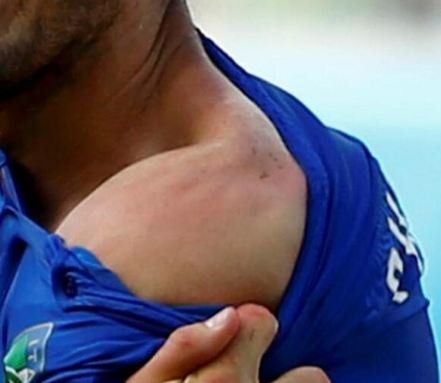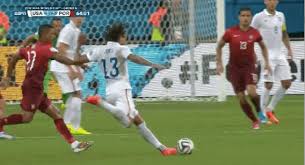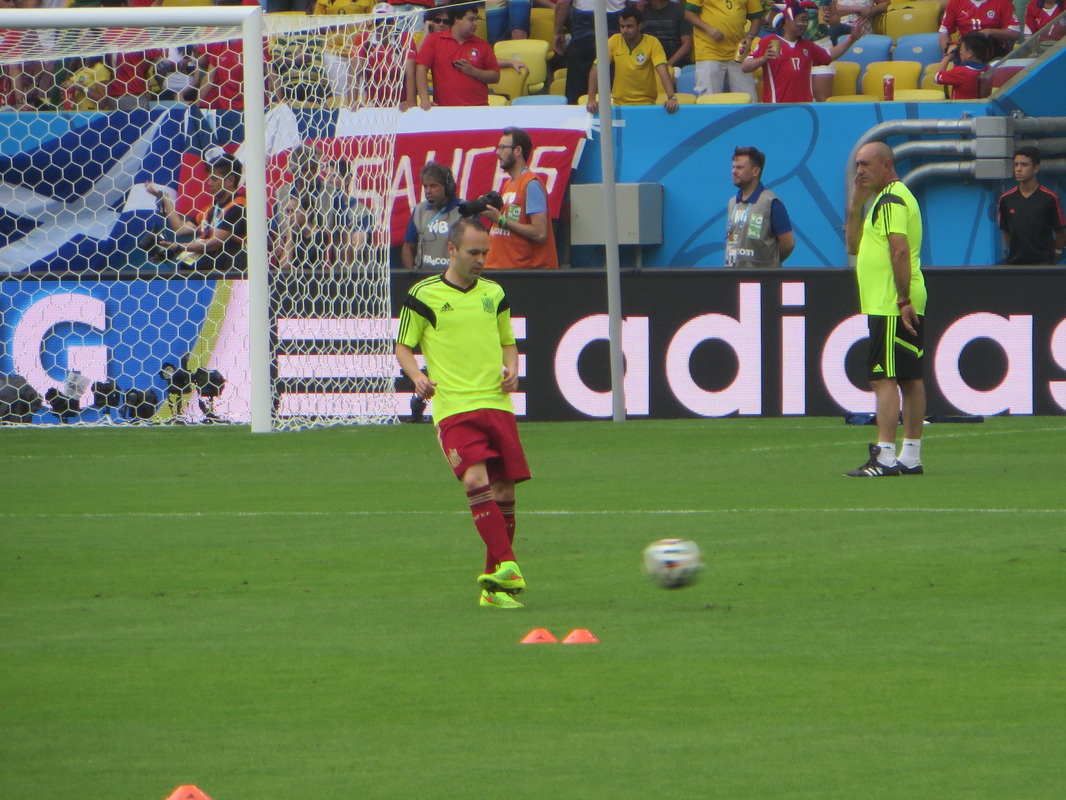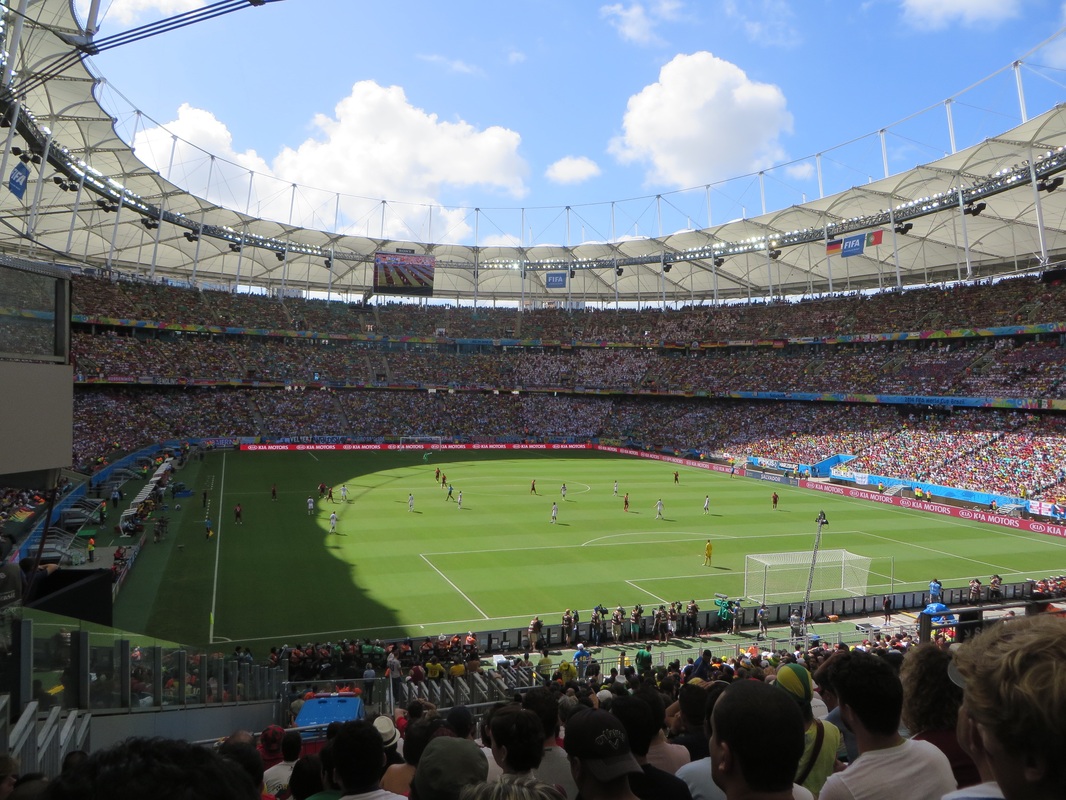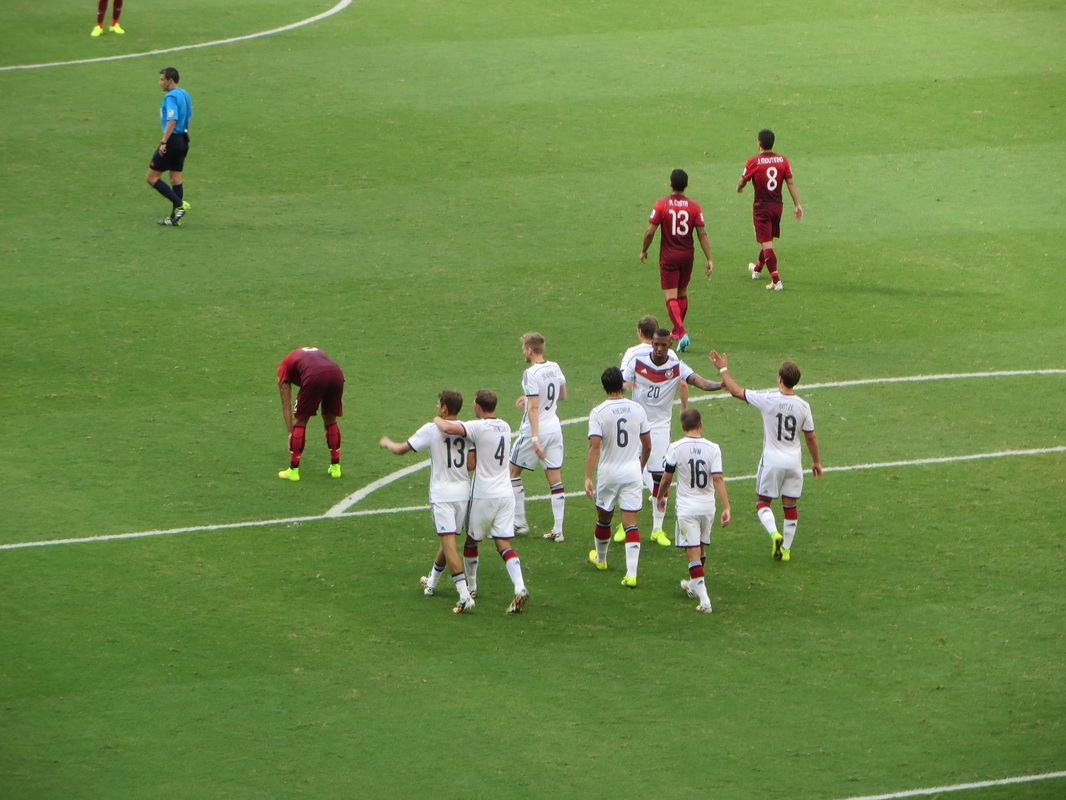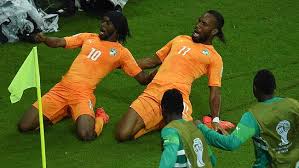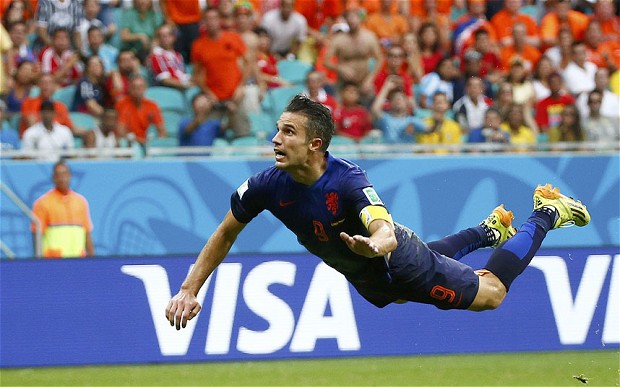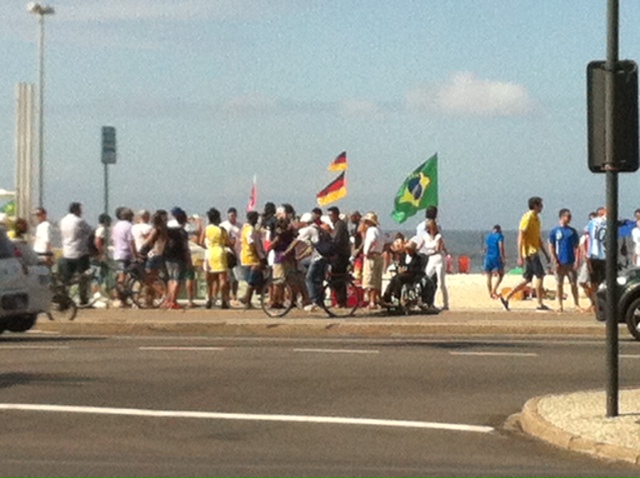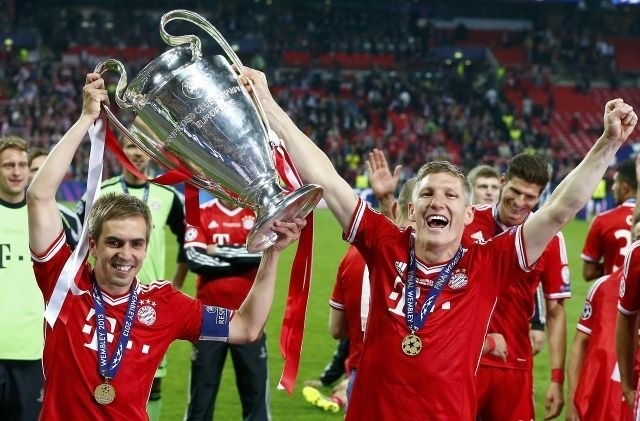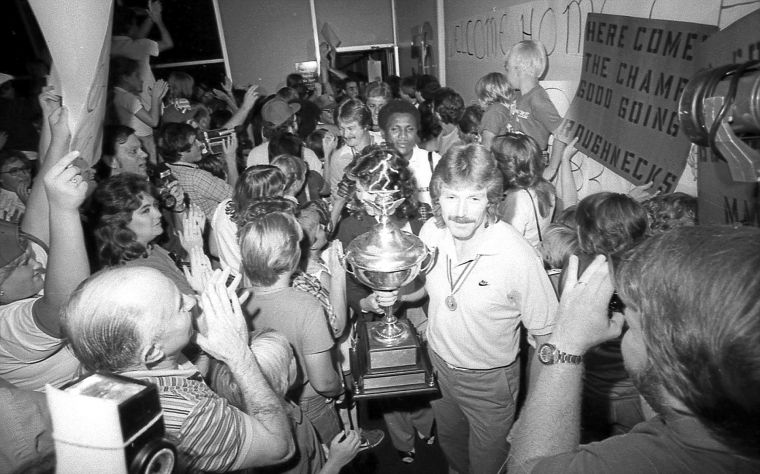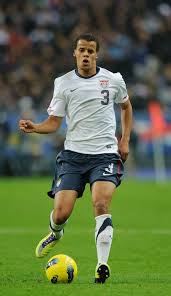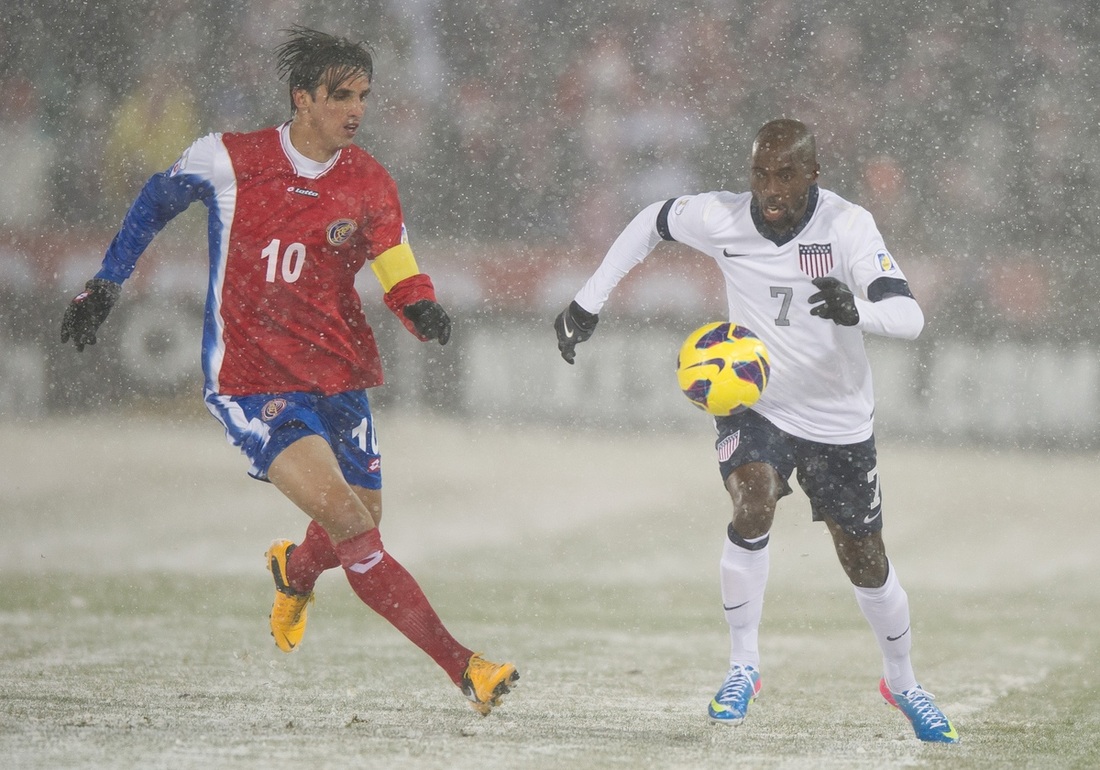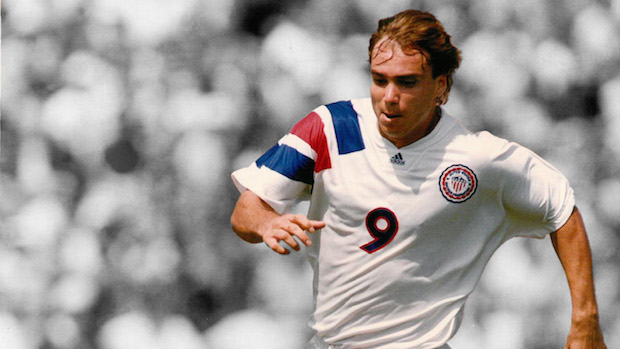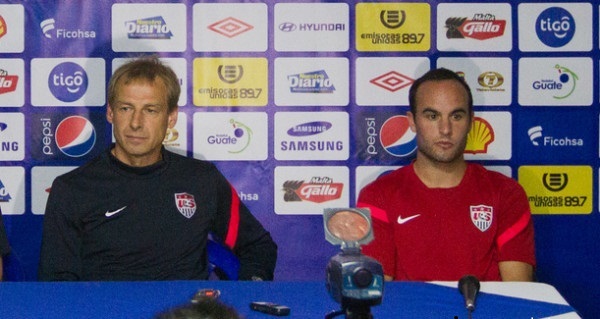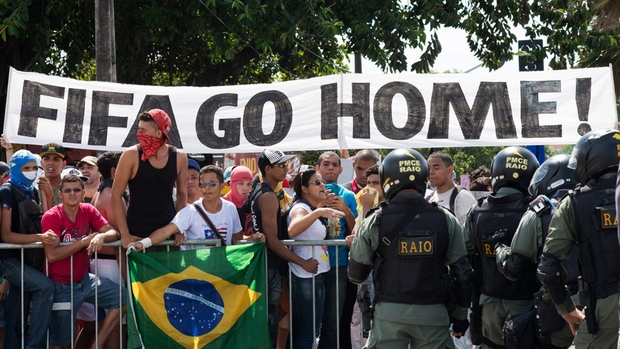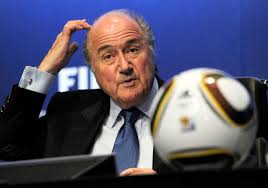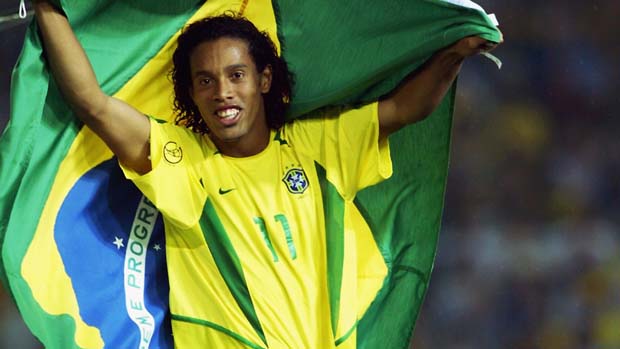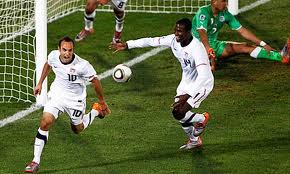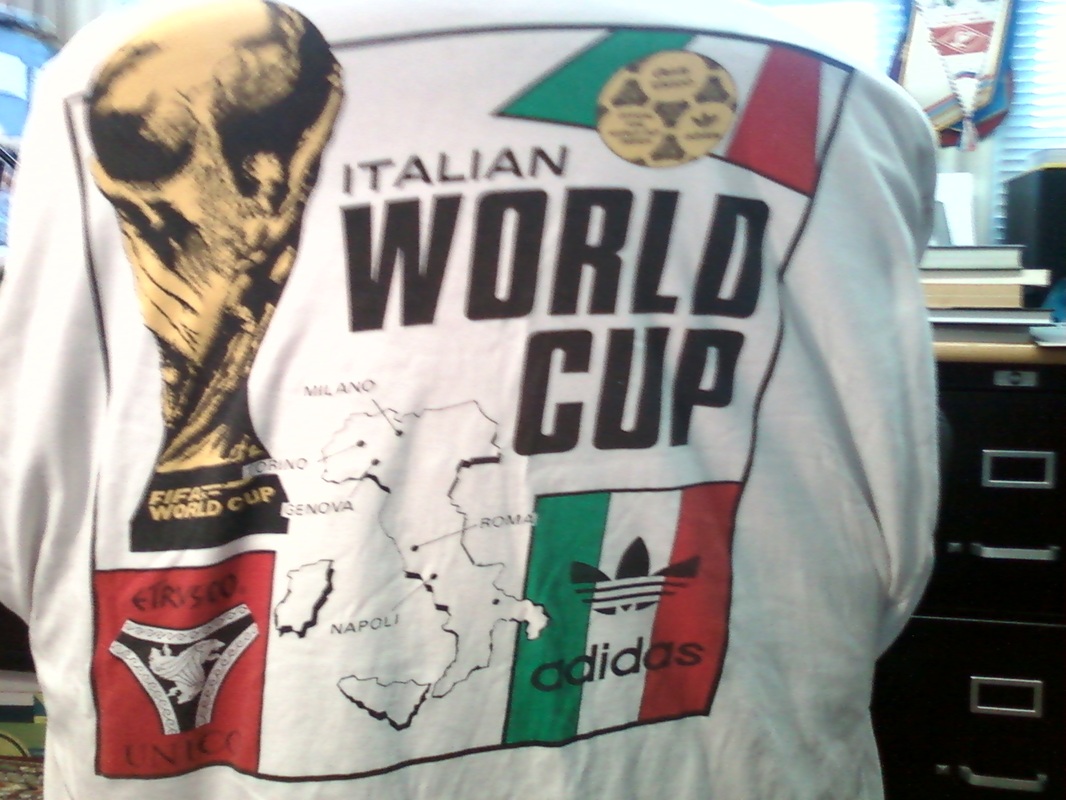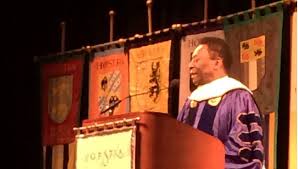|
In the modest World Cup history of American men’s soccer*, there is always room for something new. This year’s memory may very well be how Christian Pulisic propelled (a) the ball and (b) himself into the goal for what became the only score as the U.S. beat Iran and advanced to the knockout round. Pulisic was hurt, barely hobbling off the field and going to the hospital rather than playing in the second half. The overnight word was that he had X-rays of the abdomen – no speculation about whether he would play again in this World Cup. For now, Pulisic’s turning himself into a human bowling ball could become the stuff of legends – Willis Reed hobbling onto the court just before the final game as the Knicks beat the Lakers in the 1970 NBA finals and Kirk Gibson limping up to pinch-hit a homer for the LA Dodgers in the 1988 World Series. Pulisic had been wearing a serene smile in the minutes before the match, as the American and Iran teams marched out for the ceremonial playing of the anthems. I have a theory about the new look on Pulisic, who has often been the captain, based on his many vital goals. Instead, Coach Gregg Berhalter chose Tyler Adams to be the captain in this World Cup. Adams, an active midfielder, has been the core of the team in these three games, showing up everywhere, a man on a mission. He also displayed a maturity worthy of a diplomat when lectured by an Iranian reporter in a press conference the other day, after some knuckleheads in the U.S. federation had altered a version of the Iranian flag, just what was needed in dicey times.) (The poor Iranian players had a hollow look to them, because of the political overtones back home, rumors that Iranian women were being photographed by their government for wearing western fan outfits in the stands. And later there were concerns the Iran loss could be turned into more unrest, perhaps even scapegoating the players.) By contrast, Pulisic’s relaxed demeanor was noticeable on tv – a major difference from the twitchy look he carries around with Chelsea, where he rarely gets to play much. In the first two games in Qatar, in his first World Cup, Pulisic set up the only American goal in the first game, but his play was spotty, and his corner kicks were ineffective. Had people been over-rating him? I began to wonder that myself. But in Tuesday' third game, Pulisic seemed more centered, getting in the right position to score the goal before crashing into the keeper and the ground. Pulisic’s goal came in the 38th minute, with 52 official minutes left, and an agonizing 9 more of extra time, with the TV reminding us, basically every minute, that the U.S. could advance only with a victory, not with a draw. In a simultaneous match, England was on its way to beating Wales, 3-0, which meant Iran could have advanced with a draw, whereas the U.S. could only advance with 3 points from a victory. The other American players saved the day in the steam bath in Qatar, with players on both sides limping from cramps as well as the normal knocks. The World Cup did not always hold simultaneous third games in each group. In the first World Cup I covered, 1982, West Germany and Austria played in Gijón, Spain, after Algeria’s match was over, and they knew a 1-0 victory by West Germany would allow both teams to advance, so they waltzed and they waltzed, thereby screwing Algeria. That 1-0 result is now known as the Disgrace of Gijón. The U.S. has had other operatic third matches in World Cup play. In 2002 in South Korea, they were drubbed, 3-1, by Poland but at the same time in another city, a referee doled out two red cards to Portugal, making it possible for the host team to advance, along with the Americans. "This is a very good day for U.S. soccer," said Brad Friedel, the American goalkeeper, who added: "This was also a very lucky day for U.S. soccer.” In 2010, the last of the eight World Cups I covered, the U.S. teetered into the third match with Algeria, needing a victory to advance. In the first minute of extra time, the U.S. staged a full-court break, with keeper Tim Howard heaving an outlet pass to Landon Donovan, who advanced the ball to Jozy Altidore who centered the ball to Clint Dempsey who banged a shot off the keeper, but Donovan followed the ball and scored the goal. Instant history. Now there is a new landmark – Christian Pulisic’s tumble into goalmouth, and into history, or at least into a match with the Netherlands on Saturday. (*--the American women won their championships early and often, and now other nations have caught up, and good for them.) *** (Below: Tyler Adams, U.S. Captain. Could be secretary of state. Check out his thoughtful longer version online.) ( US -Algeria, 2010. The Golden Age -- So Far. )
The last time we saw the American men’s soccer team, the players were trying not to lose by six goals or more at Costa Rica. They lost by only two, which gave them license to celebrate qualifying for the World Cup, the more they thought about it. However, the tepid performance lingers in the mind, particularly during Friday’s draw for the 2022 World Cup in late November in that soccer powerhouse of Qatar. And just before that, there was the 0-0 non-event at Mexico, in front of many “Fuera Tata,” signs, urging the firing of its manager. With images of recent American futility, it was hard to get too worked up while watching the World Cup draw on Friday. In the three group matches, the Yanks will play England, Iran and one of three teams emerging from a goofus survivor scrum later this spring – Scotland or Wales or Ukraine. With help from the Injury Gods or the Karma Gods or the Logic Gods, it is easy to imagine the U.S. youth of tomorrow advancing into the second round. But….but…..but. I’ve witnessed Eight World Cups, some of them stinkers by the Americans: a sodden loss to Iran in Lyon, France, in 1998, runs replays in my mind. And then there was the wretched 2-1 loss to Trinidad and Tobago in the final qualifier to keep them from qualifying for the main 2018 tournament. Then again, the U.S. has obviously developed more talent and depth in the past decade, including some with serious soccer pedigrees like Gio Reyna, whose father, Claudio, played the best international games of his life in the Americans’ stirring run to the quarterfinals in 2002. With Claudio distributing the ball, the Americans scored one of their epic dos-a-cero victories over Mexico in 2002. And then there was the desperate full-field stampede goal from Tim Howard to Landon Donovan to Jozy Altidore to Clint Dempsey, rebound goal by Donovan to beat Algeria in 2010, and the gallant play by keeper Tim Howard in the heart-breaking loss to Belgium in 2014. So there is some very good history for the Americans in seven consecutive World Cups from 1990 to 2014. But after the U.S. missed the 2018 World Cup, I can work myself into finding flaws with this young squad that, to its credit, survived the regional scrums to qualify: Goalkeeper. The U.S. qualified for those World Cups behind four superb keepers: Tony Meola, Kasey Keller, Brad Friedel and Tim Howard, all so good they sometimes provoked controversies over which keeper to play. With all due respect to Zack Steffen, he looked slow, as if his back were still stiff, in the loss to Costa Rica. So I would suggest that position is wide open. Striker. The best moments in the past generation came when the ball was served forward to Dempsey, Brian McBride or Donovan, who knew how to convert. The U.S. has run a vanload of strikers through the regional long march, but none of them displays the poise and position, the downright self-centeredness and nastiness, of the old lot. Hard Man. Every squad needs an enforcer, who is willing to put a hurt on opponents even if he accumulates a yellow card now and then. I was a big fan of Jermaine Jones, German-born, with American schoolyard ferocity. Weston McKennie, out of action in the recent matches, has the temperament but he has too much skill to task him with dirty work. I’d make sure Kellyn Acosta is on the flight to Qatar; he has the disruptive “dark skills,” according to Dempsey, now in the chattering class on the TV programs. I find no fault in Gregg Berhalter, the U.S. coach, a soccer lifer. (An unpenalized handball deflection by a German defender kept Berhalter from being a hero in the 2002 quarterfinals.) He is part of the best age of American soccer – so far. Now he will have time to blend these talented young players to see if they can reach the level of the previous generation. Diego Maradona died two weeks before Paolo Rossi, but they were already linked -- two scamps who hijacked separate World Cups. Rossi got there first by four full years, more of a surprise than when Diego Armando later commandeered the 1986 World Cup. Maradona was expected to produce a World Cup in his career, but Rossi came from essentially nowhere, from Limbo, from ignominy. I was at both World Cups, my first and second of eight. Rossi’s rampage stunned me, a Yank who had no clue about world soccer, but was curious. Brazil was always the favorite and the experts also mentioned Argentina with El Pibe de Oro (The Golden Kid), West Germany, of course, and, reflexively, there was always England, only 16 years past its host-nation glory of 1966. Instead….instead….Italy came roaring into the World Cup in Spain, like kids on Vespas, roaring into a genteel piazza, grabbing unattended purses from table top -- the dreaded Scippatori. Italy, the Azzurri, came as a shock after a gambling scandal a few years before. Rossi apparently knew of the coup, but said nothing, and was suspended for two years – at the peak of his career, as an opportunistic forward who found unguarded entryways to the goal. Rossi was reinstated – what a coincidence – only months before the World Cup because the chatty manager, Enzo Bearzot, wanted him on the squad. I had not arrived at the World Cup in Spain for the first round, and Rossi barely arrived for the three matches, rusty and so insecure that he was waiting for Bearzot to bench him. However Bearzot kept telling him to get his stuff together, he was playing. The engine was tuned up by the second round – a bizarre three-team round robin quarterfinal. Argentina, which had won in 1978, was touted to win, this time with chunky spectacular Maradona. Brazil, the perennial darlings who played with a flare, was also touted to win, with brilliant offensive players named Socrates, Zico and Falcao. Italy played Argentina in the first match, and a swaggering defender named Claudio Gentile, known in Italy as Qaddafi, not only because he had been born in Libya but because he tended to hurt people. Non-molto-Gentile mugged Maradona early and often, rendering him pointless, insensate. (That is Gentile, Qaddafi, shirtless, in the video above.) Meantime, vroom, vroom, here came Italy, players operating in space they never saw in the nasty defensive-minded Serie A of Italy. They moved the ball upfield and then, out of nowhere, came Paolo Rossi – still in the starting lineup? --che sorpresa – operating in wide open lanes that could have accommodated six lanes of Italian autoroutes. Rossi did not score, but was a threat, and Maradona hobbled off, and Gentile swaggered in victory. Next, Italy played Brazil, which moved the ball so magically for 75 or 80 yards but then stumbled into Italy’s defensive chain – Il catenaccio. I remember one moment. The Brazilian right back, Leandro, wanted to get into the fun of moving the ball upfield, so he took off downfield. His swath of unguarded field suddenly was invaded by 12 or 14 Vespas, motors roaring, vroom-vroom. Italy won, and Rossi scored three goals, I was beginning to get the point. Rossi scored twice in the semifinals against Poland, whose best player was banned for too many yellow cards. Then in the finals, with West Germany’s best player hobbled with a leg injury, Rossi scored once and Italy won, 3-1. Rossi was voted the star of the game, and while I was in Madrid, writing about the match, my friend Thomas Rogers of the Times, back home in New York, wrote a lovely Man in the News profile of the surprising Paolo Rossi: https://www.nytimes.com/1982/07/12/sports/man-in-the-news-from-disgrace-to-hero.html I will always love the Brazil of 1982 – the best team ever to not win a specific World Cup – but I was now a wannabe Italian. Other teams, other stars, come and go: Zidane’s beautiful final in 1998, the U.S. getting cheated by a blatant handball by Germany in 2002, Spain’s coming-of-age in 2010, Germany’s nearly-perfect meshing in 2014. Now that I am retired and free to root, I wait for the United States to mature (which it is doing with magical frequency from young stars like Reyna and McKennie and Pulisic in Europe) But I always have a second team – Italy – the blue shirts, the merry little tarantella of an anthem, the legends of maestri like Roberto Baggio and Andrea Pirlo and Alessandro Del Piero, and always going back to Paolo Rossi, who came from disgrace and took over a World Cup. Vroom-vroom You always remember your first. * * * (Obit of Paolo Rossi in The Guardian.) https://www.theguardian.com/football/2020/dec/11/paolo-rossi-obituary 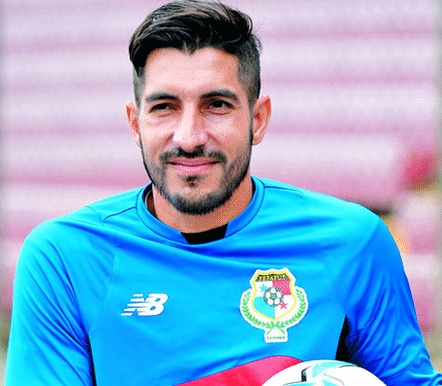 Jaime Penedo, Panama Jaime Penedo, Panama I've kind of gotten hooked on the strange little ritual of the World Cup, when both teams line up in the tunnel, side by side, shuffling around for a minute or two before marching on to the field. I imagine what the players are thinking – planning their best I’m-mortally-wounded dive, or discreetly eyeing their opponents. (“Look at the muscles on that dude.”) On Tuesday I saw John Obi Mikel of Nigeria (6 feet, 2 inches) and Lionel Messi (5 feet, 7 inches, at most) exchange what looked like an authentic hug, between two captains, two No. 10s. I assumed they go back a ways – and they do. But I really got into the lineup sideshow a few days ago, watching the Panama keeper, Jaime Penedo. One of the features of the lineup is that each player marches onto the pitch accompanied by a child. (You guessed it, it’s a promotion, for the fast-food empire that has contributed to the fattening of children, adults, and a chief executive who appears to be neither. The company recruits kids from all over the world to march in this brief ceremony before the lads start whacking away at each other.) Penedo, a stranger to me, turned to a young girl of maybe 10 or so and began chatting, just like a real human being, not a sports star. He was talking and smiling, and as they marched onto the field, the little girl glanced up at the man in the gaudy outfit, as if thinking, “Did he just talk to me?” I looked him up – 36 years old, been everywhere, including a few years with Bruce Arena and the Los Angeles Galaxy, now at Dinamo Bucharest. I don’t know what language he spoke to the young girl; one article says he speaks some English, not fluently. jamesmontague.com/2018/01/27/tifo-interview-with-panama-goalkeeper-jaime-penedo/ If there were such a thing as reward for grace in this world, Penedo would have turned in what the British soccer writers call “a clean sheet” – a shutout, that is. But life is not like that. Penedo was peppered early and often in a 6-1 loss to England and Panama's first World Cup ever will end on Thursday against Tunisia. As for Mikel and Messi. It’s true, they go back a ways, to 2005, in the World Youth Tournament, when Mikel seemed to be outplaying Messi for the Golden Ball, as best player in the tournament, until they met in the final, and Argentina won. “Yeah, Messi stole the Golden Ball off me,” Mikel told the Guardian recently, raving about Messi as not being human. https://www.google.com/amp/s/amp.theguardian.com/football/2018/jun/25/mikel-john-obi-lionel-messi-nigeria-argentina-world-cup They have co-existed at the top tier of European football for more than a decade, with Mikel having a long run at Chelsea (he’s now playing in China) and Messi a lifer at Barcelona. 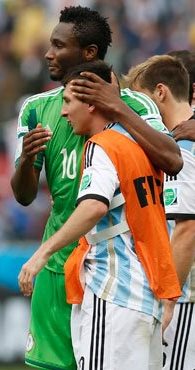 Mikel, Messi,another time Mikel, Messi,another time On Tuesday, Mikel gallantly held his team together (and calmed a few younger teammates.) But Messi took a gorgeous pass and found the upper corner of the goal to put Argentina ahead in the 14th minute. Nigeria tied the match, needing only a draw to advance, but could not find a more conservative gear for spreading the ball around the pitch, killing seconds off the clock. I realized I had seen this match before – 1994, in Massachusetts, when Roberto Baggio saved Italy (remember Italy?) with two very late goals against Nigeria. Twenty-four years later, the very same lack of patience cost Nigeria all over again, in the 86th minute. So Messi advances; Mikel’s World Cup is over. More players will line up in the tunnel, escorting a child onto the field, maybe finding the grace to smile and chat. With no soccer match Friday, I was at loose ends, as you can imagine. Turned on the tube and re-discovered another sport.
Guy with a bushy head of hair sticking out from under his ball cap, pitching furiously, getting himself out of jams in two innings of relief. High drama. No biting. No flopping. No unseen stopwatch in the umpire’s hand. Timeless, to say the least. Baseball. Soccer. The yin and the yang. The other night I was pushing my book (did I mention my soccer book?) at the Midtown Scholar, a major used-book emporium and café in funky downtown Harrisburg, Pa. Somebody asked the question, do I see soccer supplanting baseball in the hearts and minds of America? I looked in the front row and saw a father and son, with St. Louis roots, carrying my Stan Musial book. We had chatted before the talk. My answer was no, that baseball had a hold in the cities of America, where memories of Ty Cobb and Josh Gibson and Roberto Clemente still live. Americans know and feel those old rivalries – Yankees and Cardinals, Dodgers and Giants – the way traditional soccer nations honor the derby – Real-Atlético, Tottenham-Arsenal, AC Milan-Inter. Soccer continues to boom in the U.S. Look at the huge crowds watching the World Cup, immeasurable by single-set gauges. Look at the rivalries and rising caliber of Major League Soccer. Look at the weekend audience for great soccer on the cable. There are now five major team sports in the U.S.A. And I don’t think soccer is fifth, either. But supplant baseball? Not when a young pitcher like Jenrry Mejia, with great energy and great stuff, can get himself into trouble and get himself out in two straight innings, on the road, in grand old Pittsburgh, near the confluence of the rivers. The Mets lost an inning later. Of course. Nice to see nothing has changed while I've been watching the World Cup. In the past week I have heard people refer to “the greatest World Cup match in U.S. history” or “the best victory in U.S. history.”
I must have heard that about 10 different matches. For a reputed outsider, USA is starting to develop a past. It is one of seven nations to have qualified for the last seven World Cup tournaments. It has reached the knockout round four of those times. This is no small accomplishment, to go along with the knowledgeable crowds everywhere. I thought of that growing history on Thursday, just before the tense struggle with Germany in monsoon-lashed Recife. I was in a green room at MSNBC waiting for my minutes on camera to mention my book as often as I dared. Another network guest sharing the green room was Jeff Agoos, the defender on the 2002 World Cup team, now working with Major League Soccer. In that hope-giving year, Agoos had been in precisely the same situation the US now faced in Brazil – a simultaneous third match that could have gone either way. Agoos smiled when I mentioned the similarities. He had played in the first two matches in South Korea, scoring an own goal in the 3-2 upset over Portugal, and playing the full 90 in the draw with the host team. Then he was hurt in the third match, as the US was being hammered by Poland, 3-1, and was replaced by 20-year-old DaMarcus Beasley. Agoos went into the locker room for treatment – and followed the news as Portugal had two players tossed out of the match, and gave up a goal to Park Ji Sung in the 70th minute. Agoos recalled how the US survived that loss to Poland. From that soft crash landing came the 2-0 victory over Mexico and the 1-0 loss to Germany, which some experts think was technically and competitively better than the Mexico match. With huge crowds and unprecedented television ratings all over the country, the U.S. is adding to its soccer history. On Thursday I stuck a pair of plugs in my ears and watched both matches in the newsroom of MSNBC. The U.S. stood off a furious attack in the first 15 minutes but gave up a shrieking parabola by Thomas Muller for a 1-0 deficit that could have gotten worse, much worse. For 23 tense minutes, the US was in danger of being knocked out of this World Cup after Ghana rallied for a draw with Portugal. The Germans respected the game by playing hard while seeking a record-breaking goal by Miroslav Klose. Then, in the 80th minute, good old Cristiano Ronaldo stopped being the preening, smirking pretty boy and became the savior of the Americans’ World Cup, lashing a goal that put Portugal ahead, 2-1. When that game ended, I heard cheers around the newsroom. Many journalists had been following the match on their computers. Twelve years after the anxious wait in Daejon, South Korea, the USA had lost a perilous third match yet survived the simultaneous match. One more example of history: a few weeks ago, in that same green room, I ran into Bruce Murray, the striker of the 1990 American team. One manic night in Olympic Stadium in Rome, Murray had blasted a free kick at Italy’s superb keeper, Walter Zenga, who barely flicked it away, but Peter Vermes nearly put the rebound under Zenga, who groveled to keep the ball from crossing the line. Now 46 and a youth coach in Bethesda, Md., Murray could only shake his head at how close he and his teammate had come to scoring against Italy. In the future, fans will agonize over the ball that squibbed off Michael Bradley’s foot against Portugal last Sunday, and how three or four defenders allowed Ronaldo to lash a cross that a teammate headed for a goal. Americans will remember those unfortunate moments, the same way they talk about the Joe Gaetjens goal that almost nobody saw in 1950, the Paul Caligiuri goal in 1989, the Landon Donovan goal in 2010, the John Brooks header in 2014. They will also remember the gallant battle to stay within 1-0 against Germany (the team I picked to win this Cup.) We can all argue the rankings of these great moments, these terrifying moments, but the point is: this country is starting to have a soccer history we can actually debate. (Photo Above: Peter Vermes Battles Italy's Franco Baresi. Now part of American soccer history.) Despite my not-so-closeted fascination with the Azzurri, I was going about a very busy day on Tuesday.
The Italians were playing Uruguay in far-off Brazil. I was with my wife in a modest but wonderful Indian restaurant near Harrisburg, Pa., en route to family, friends and pushing my soccer book. My cell phone buzzed. It was Doug From Florida. He is half Latino. Sometimes he honors me with messages in Spanish. This one said: “Lo siento.” I am sorry. I wrote, “Que pasó?” What happened? I’m sure he had figured I was watching. The words popped up on my phone screen. “La Mordida de Dios.” The bite of God. I knew this was a pun on the blatant and unpunished punched goal from Diego Armando Maradona in 1986. The Hand of God, Maradona called it. Bite? Soccer? Maradona Arrogance? It could only be Luis Suarez. And it was. So instead of talking about the games, about Michael Bradley’s stumbles, about Landon Donovan's absence, about Klinsmann’s lineup against Germany on Thursday – or even the subsequent departure and eternal ansia of Italy – people were talking about The Bite. This is some World Cup. The NYT has asked me to write something about Germany-USA for later today. We're heading back to NYC for a baseball program at the Museum of the City of New York this evening. Your opinion about La Mordida de Dios? For the last 15 minutes, the United States had more in the tank than Portugal did.
Jürgen Klinsmann sent in 20-year-old DeAndre Yeldin, to provide fresh legs, just as the astute Taylor Twellman in the ESPN booth had suggested he should, and the youngster moved the ball to set up Clint Dempsey’s go-ahead goal. In the closing seconds of stoppage time, the legs – and the minds – deserted them. The ball squirted loose from Michael Bradley and the defenders could not keep the ball away from Cristiano Ronaldo on the flank. But any one of three defenders – somebody, pick a number – could have shut down Varela, the only red jersey heading to the box. Three large defenders, three spectators, one header, and Portugal drew the USA, 2-2. For the second straight game, Klinsmann made a great late substitution – John Brooks for the game-winning header against Ghana, Yeldin for the time-killing and aggressive move against Portugal. But the USA did not win, and now the players will have to live with it on a brutal ride back to their base before Thursday’s match against a more rested Germany. Any talk of a potential waltz between Germany’s Joachim Löw and the USA’s Klinsmann, good friends and colleagues, will have to wait. For now there is only the hangover feeling of a superb rally and a last-second giveaway. But before that, there was the superb dribble and hooking shot by Jermaine Jones that got inside the post. I love his swagger and his shoulders, and seeing him blast that goal was like watching Charles Oakley, the old New York Knicks enforcer, dunk from the foul line. Not supposed to happen, but it did. One more thought: this is a great World Cup, isn’t it? (A few weeks ago in Boston I met Nate Waters, who plays soccer for Principia College in Illinois, near St. Louis. He told me he was catching a few matches in Brazil, and I said I was extremely jealous. I was curious what a college player would find interesting about being at the World Cup and made him promise to write. Here is his second report from Chile-Spain in Rio on June 18.) By Nate Waters Technically this game was played in a neutral location. However, anyone in that stadium would have told you it was a home match for Chile. With 70,000 fans in the stands, you might have seen a few seats where people were not standing up screaming at the top of their lungs; those were the Spanish supporters. Hours before the team even arrived at the Maracanã stadium in Rio de Janeiro, the Chileans were dancing in the streets, posing with La Policia and searching for anyone sporting a Spain jersey so they could surround them with flags and chant, “Chee Chee Chee! Lay Lay Lay! Vive Chile!”. With Chile neighboring Brazil, I learned that a majority of the supporters are caravanning through the host country to watch La Roja. Their next stop will be São Paulo when Chile takes on the Netherlands to see who will ultimately win Group B. Spain was the first team to begin warming up, and right from the start I thought that they had the game in the bag. Watching players like David Silva, Iniesta, Xavi, and the other big names we all know move the ball with such pace and precision, I couldn’t believe that the Chilean midfield would even be able to touch the ball at all. Then, as I am turned around, taking a photo for a couple behind me, the stadium erupted into cheer as La Roja jogged out onto the pitch. The Chilean 12th man was fierce, and most likely around 65,000 people shouting in unison. As the first half progressed and Spain could not manage to put together more than five passes, it was unbelievable to watch the same midfielders for Barcelona and Real Madrid just turn the ball over so easily. The final pass that they had executed so many times before in the Euro and World Cup just was not there. It just did not feel right to watch Iniesta pass it straight into the Chilean defense. Every Spanish touch was preceded by none other than a record-setting decibel level of relentless whistling from the Chileans to show their disapproval. And when Chile would string together a few passes, the crowd would sing “Olé” in unison for each successive pass, almost helping the players break down the defense, find the open man and diminish the Spanish mentality. I was also in shock by the choices by Spanish manager Vicente del Bosque, when he subbed in Fernando Torres to aid the non-existent office. Torres just is no longer a top-class striker. With his rather mediocre career at Chelsea and relatively no impact on the first game in Rio, I could not believe that del Bosque had not chosen David Villa. Villa single-handedly carried Spain’s offense in the 2010 World Cup, and although some argue he is past his prime, he just came off of a La Liga title and UEFA Champions League Final with Atletico Madrid. Yet he sat on the bench and watched the team he scored so many goals for lose to the underdog and be eliminated from a tournament in which they were a favorite. While most likely every broadcaster, writer and analyst picked Spain to stroll through the group, it turns out that in a breezy Brazilian stadium, it was a good night to be Chilean. Germany-Portugal, June 16
By Nate Waters We left three hours before kick-off, and arrived at the stadium six minutes into the game. We all thought we would find our seats in plenty of time, watch the players warm up, and scream with the German fans the national anthem that we had looked up on our phone the night before. But when people walking on the highway make more progress than you in a car, you know that the supporters will do anything to see their team. Our taxi driver just parked the car in the middle of the street and yelled at us in Portuguese to run down the hill and to the right towards Arena Fonte Nova in Salvador, Brazil. The Portuguese national anthem had finished and the game started as we were receiving a less-than-thorough pat down at security. Although the tickets clearly stated we were not allowed to bring food into the stadium, the bag of Oreos in my sister’s purse made it through just fine as we sprinted up the 7 flights of stairs to our seats. Watching the game, it was obvious that Germany was going to win. They play with a sense of conviction, a mental discipline where one or two goals is never enough. When most teams would sit back after having a 2-0 lead, the German’s continued to attack by pushing the ball out wide to players like Mesut Özil who can place the ball wherever he likes inside the eighteen. Also, it helps when one of the star Portuguese players, Pepe, decides to head-butt Mueller after his hand grazed the German forward’s cheek earning Pepe a red card. At that point, the Portuguese fans behind us packed up their flag, stopped the singing, and went straight to the concession stand to grab a beer. The German fans loved it, especially because of their disdain for Pepe and Ronaldo after Real Madrid, the Spanish club team who they both play for, eliminated in humiliating fashion Bayern Munich in the Champions League semifinal just two months earlier in Germany. The second half was the same story. Cristiano Ronaldo shanked two free kicks, and the third one well within his range only had one German defender in the wall; almost baiting Ronaldo to put the ball on net and restore some of the pride for the Balon D’Or winner. A World Cup game is one of the most surreal experiences any sports fan could have. The field is a golf green, primed to be shredded with spikes-up tackles and blasts from 30 yards out. It is eleven players attempting to play with one mind, and a manager limited to a spray-painted box ready to scream at every call regardless of who committed the foul. Ten goals have already been scored in the Arena Fonte Nova from the Spain-Netherlands blowout and the German 4-0 victory. When France takes on Switzerland in the same stadium, it’s unlikely that one team will score more than four goals. The stadium has certainly marked itself as one of the premier places to watch the World Cup in just the first round of group play. (Nate was at Chile-Spain in Maracanã on Wednesday.) Jürgen Klinsmann is a pragmatist, not an egotist. He built this American soccer team on the needs of a three-match first round, which demands endurance and strength and youth.
When Klinsmann left Landon Donovan off the squad going to Brazil, it was no act of domination, showing who was boss. I thought he was wrong, and still do, because, as a lot of people have said, sometime in this first round the USA just might need somebody to bust a goal, late. Then again, they did that Monday in the steam bath of Natal, and it came from one of the five German-Americans, players with two passports, Klinsmann recruited to this team. John Brooks, 21 years old, with a father from Illinois and a mother from Berlin, inserted at halftime because of injury, popped in a header in the 86th minute for a 2-1 victory over Ghana. This would not have been Donovan’s kind of game. But the next one against Portugal, or the one after that against Germany, might be the place where a wise, fleet attacker could pull out a draw, or a victory, to get the Americans into the round of 16, now a possibility. When the Donovan debate was going on – and maybe it still is, since I am bringing it up here – I never could summon up any vitriol toward Klinsmann’s impact on this team. His credentials are too good. He was a fast and wily forward who scored World Cup goals, won a World Cup as a player and coached a third-place German team in 2006. “He knows stuff,” I told people. “He is no fool. He may think Donovan is soft, or past it. I think he’s wrong. But he’s a good coach.” The USA has had other good coaches. Bruce Arena coached two of the best matches the USA has ever played, over Mexico and a bitter loss to Germany in 2002. (Klinsmann, uninvolved, thought the USA outplayed his homeland.) Bob Bradley had a team that scored a desperation goal against Algeria in 2010 -- yes, the Donovan goal. Now Klinsmann has done something neither of them did. He has beaten Ghana in the World Cup. The Portugal match? They have injuries and a red card absence by the hot-headed Pepe. Klinsmann will put together a team for Sunday. He knows what he is doing. Now it is time for the players to recuperate. And us. Your thoughts? He played only 28 minutes, did not score a goal or make an assisting pass. But Didier Drogba still dominated the match and – well, except for Robin Van Persie’s airborne header – dominated the first four days of the World Cup.
There was something surreal about the way he raised his Ivory Coast team when he came into the match in the 62nd minute with Japan leading, 1-0, on Saturday night. He was out with a thigh injury – and advanced old age, at 36 – but he charged a lethargic and clueless squad just by stepping onto the field. It was as if the Ivory Coast players said, “Uh-oh, the old man is out here. We’d better get in gear.” They started making intelligent runs and smart passes, and scored in the 64th and 66th minutes, both on crossing passes by Serge Aurier. “There is no game in the world like that where a single sub changes the complexion of the game completely. Japan had their defensive concentration break down completely,” wrote my pal Doug From Florida, who knows this sport. I had a stake in this, because I had written an advance article for Cigar Aficionado Magazine in which I had picked Drogba as one of the seven stars to watch during this World Cup. I had seen him carry Chelsea on his strong back in the Champions League final in 2012, his last match for Chelsea. He played the whole field that night, striker, sweeper, midfielder. I thought he could give Ivory Coast – the entire continent of Africa – a boost in this World Cup. Soccer fans know that every World Cup consists of five distinctly different rounds – group play, round of 16, quarterfinals, semifinals and finals. Each one is separate and worthwhile. Nations have great matches in the first round (Algeria in 1982, Trinidad & Tobago in 2010) and vanish before the knockout round. But still, their fans have memories. Emerging fans in the USA would do well not to think about the latter stages. Enjoy Drogba in the here and now. The world is still waiting for the great African team. The players are there, leading squads all over Europe, but the national teams that are collected for major tournaments often seem hit-or-miss, coached by Europeans, not quite ready for the late rounds. Still, there moments. I picked Drogba to be a charismatic presence in this tournament because I remembered being in Italy in 1990, thrilled to see 38-year-old Roger Milla, who had already retired once, come off the bench for Cameroon, over and over again. The Russian coach waited until the sun went down over the lip of the stadium, and then sent in the elder. Milla carried Cameroon into the quarterfinals, first time Africa had been there. Here’s what I wrote, back then: http://www.nytimes.com/1990/06/24/sports/sports-of-the-times-the-old-man-waited-for-the-shadows.html Now Drogba forces his teammates to play together. Don’t think about who is going to win this thing. Think about the first round. Ivory Coast vs. Columbia on Thursday. Two teams with 3 points already. At high noon. Drogba may not start. Then again, Roger Milla did not start, either. (I will be writing after the USA match Monday evening.) The World Cup has been amazing already -- Van Persie's header, Costa Rica's upset, Drogba's impact (more on that later), Switzerland's stunner. It has also been an occasion for great social events -- as I keep calling the World Cup in the USA: at the very least, a quadrennial party. Local legend Ron Swoboda came back to town for some events with the Mets, and happened into a private birthday celebration for Carmela Lamorgese, one of the three DeBenedettis sisters who run Mama's in Corona, not far from the Mets' ballpark. Italy's first-round matches always induce considerable ansia and this one was no different. The match was scoreless for 35 minutes, but then Marie DeBenedettis, who also cooked much of the meal, decided to use a house special of lowering the lights in the back room to change the flow of the match. Zip. Italy scored, and went on to a 2-1 victory. Mama's is not doing public viewing of the World Cup, but the meal we enjoyed can be replicated, Tuesday-Saturday. Ron lives in New Orleans now -- and was impressed with the cucina at Mama's. The World Cup and my new book got me invited onto Steve Kornacki's Sunday show on MSNBC, along with Bruce Murray, in the studio, and Brianna Scurry, from elsewhere -- two World Cup veterans. .
The highlight for my wife Marianne was to meet Kornacki's father and sister, and her weekend hero in person. Isn't soccer wonderful? For months I have been using the expression “dog years” to explain why I thought Spain would fall short in this World Cup.
I thought the unprecedented two European championships sandwiched around the 2010 World Cup championship would amount to too many matches, too many miles, for the nucleus of this wonderful team. But I never expected to see Iker Casillas flopping around on the grass like an aged Willie Mays stumbling over second base in the 1973 World Series. Spain was suddenly old, in a 5-1 loss to the Netherlands, which played with a talented fury, as if to make up for its cynical foul play in the 2010 World Cup final. Maybe it was the Curse of Diego Costa that got Spain. Newly signed on as a Spanish national, he made his debut against his actual homeland, to the accompaniment of vicious whistles and boos. Then he committed an ugly head butt – not yet caught by FIFA scrutiny – and left the match. Bad vibrations for a side that didn’t need his form of new blood. In a number of interviews about my new book, people ask me to define the “beauty” of soccer in the subtitle. (The “dark side” part is one glimpse of Sepp Blatter’s face, and résumé.) The beauty part was Robin Van Persie making a mid-air connection with a crossing pass, timing his leap, heading the ball over the helpless Iker Casillas, and then making a three-point landing on the damp grass – Van Persie’s nose and two knees. Dog years. Beauty. This result was more dramatic than anybody could have imagined. “Wowwy wow wow!!!”
This text message came clattering over my cell phone at 4:17 PM, Foley’s time. “Shades of Nicola Caricola” hit my screen at 4:18 PM, from a correspondent who shall be identified as Doug From Florida. Both were noting the own goal in far-off São Paolo, greeted with mostly horror by the large crowd in the Irish baseball pub on New York’s W. 33 st. Many of the patrons were wearing the familiar yellow jersey or t-shirt. As somebody at our table said, everybody’s default position in the World Cup is Brazil. (Except Argentines.) The “Wowwy wow wow!!!” speaks for itself, but the “Nicola Caricola” in question was an old Juventus player who became legendary by making an own goal in the very first game for the MetroStars, from which the franchise is still recovering. In jam-packed Foley’s, there was the frisson of danger that Croatia might profit from the own goal propelled into the net by Marcelo of Brazil. Some of us at the table spent a few minutes telling the tragic tale of Andrés Escobar of Colombia who scored an own goal against the United States in 1994 and was gunned down in a parking lot when he got back home. Before long, Brazilian talent and the referee's hasty whistle for a penalty kick combined for a 3-1 victory for the host team. Finally, they were playing the World Cup. I was hoping that Brazilians would make their points about the brutal costs imposed by FIFA for holding the World Cup, and yet balance it with their love of futebol. I have been thinking that Brazil players would be somehow affected by the demonstrations planned around the country, but on the first day the yellow jerseys swarmed. Neymar carried himself with the assurance of a young man who knows he is handsome and talented. Not sure he meant to hit a slow grass-skimmer inside the right post, but that may be the way life works for Neymar. I sold a couple dozen copies of my new book about the eight World Cups I covered, hung out with old friends from Hofstra and elsewhere, met some really nice people. For the duration of the World Cup, I'll be commenting on the matches here and there on a daily basis. Reactions and Comments are more than welcome. Muito obrigado. I still have not made it to Brazil -- although following Brazilian fans around Barcelona in 1982 and watching Sócrates and Falcão on the field probably qualifies me. I describe that seminal moment in my book.
Most soccer fans would list Brazil as their first or second favorite team. Well, maybe not Argentines. I did catch some Argentina fans enjoying Brazilians dancing and playing music in the parking lot in New Jersey two summers ago. But that was before a friendly. If it’s not the soccer, it’s the music that makes people think we have been to Brazil. I was exploring that theme during my interview with John Schaefer, who has been producing New Sounds and now Soundcheck on WNYC-FM in New York for many years. That lovely interview was played Tuesday, June 10, after 9 PM. Schaefer asked me to pick three songs that represent my love for soccer. For two of them, please check out Schaefer’s show or podcast. The third came directly from his show 13 years ago, when he played a “new sound” – a CD named Casa, featuring the trio, Morelenbaum2/Sakamoto, with a photo of Corcovado on the front. You know how sometimes you hear a “new sound” and you wonder how life existed before that moment? I can trace a few albums or songs to that first ethereal experience. Out of the ozone came Ryuichi Sakamoto, a Japanese activist-pianist, Jaques Morelenbaum, a Brazilian cellist, and Paula Morelenbaum (wife of Jaques), a singer. They recorded songs by Antonio Carlos Jobim in the house of Jobim – hence the Casa – and gave them a unique jazz/samba interpretation. I went out to Tower Records the next day and bought the CD. Been playing it ever since. The counter in my iTunes says it is my most-played album. Omigosh, where to begin: melancholy songs of love, found and lost. Fotografia, about a couple in a bar along the beach, ending with the Portuguese aquele beijo (that kiss) sung so insistently by Paula Morelenbaum, and then in English, with her delightful inflections. Estrada Branca, about memories of a couple walking, walking, walking, and then her sighting the former lover “walking on my street.” When I looked up the Portuguese, the last words of the song are “death wish.” The American lyrics were quite a bit more upbeat. So it goes. But the song I chose from Casa was Jobim’s classic Samba do Avião, once recorded by Tony Bennett as “Song of the Jet,” about flying home to Rio. It starts with Sakamoto’s rhythmic piano, incorporates Jaques Morelenbaum’s moody cello, and features Paula Morelenbaum’s soaring voice. After touchdown, there is a long jazz riff about the energy of Rio. In musical terms, we might as well all be Brazilians. For me, it goes back to the classic Getz/Gilberto in 1963, with Astrud Gilberto singing some of Jobim’s songs, including The Girl From Ipanema. Then there was Sergio Mendes and Brasil ’66. My pal Doug Logan got me hooked on Caetano Veloso doing Jobim, doing Michael Jackson. And some Brazilian friends have introduced me to Gal Costa, João Gilberto, and recently Ana Carolina e Seu Jorge. And on the classical end, the music of Villa-Lobos. Almost forgot the writer-singer Susannah McCorkle, who sang in Portuguese, Italian and English, and totally owns the Jobim classic, "The Waters of March." So, yes, I have been to Brazil. Will be watching – and writing about – the World Cup for this site for the next month plus, starting Thursday, from 3-6 PM, at Foley’s on W. 33 St. in Manhattan, selling my book, watching Brazil-Croatia. The iPod goes with me, Brazil only a touch away. Here is the link for the podcast of the interview: https://www.wnyc.org/radio/#/ondemand/378545 Brazil did not win the World Cup as host in 1950 – Uruguay did -- and I’m not at all sure Brazil can win this time, either.
Six hosts have won the championship in 19 World Cups. However, despite being the five-time champion, with a huge stock of talent, and a superb coach, Brazil will be playing at home, during the most heightened political atmosphere I have ever seen at the eight World Cups I covered. There are always issues at a World Cup, but this is different. In a time of instant social media, a rising generation of Brazilians has identified futebol and FIFA and its deceptively loopy president Sepp Blatter as part of the problem in contemporary Brazil. Building roads and stadiums and upgrading hotels and airports for rich tourists has been linked with rising bus fares, disruptions in the favelas, and other indignities of modern life. The land of the beautiful game is questioning its patrimony. Does that matter to the outcome of the World Cup? The Brazilian players will be sequestered, but not immune to cell-phone calls from wives and girlfriends, perhaps relaying news that their aunt was tear-gassed in her neighborhood or their uncle was hit over the head by police while crossing a street. As professional as they are, the Brazilian players will be aware of divided feelings in their own land. This cannot help the concentration needed to survive a seven-match marathon following the brutal European season most of them endure. The injuries are mounting for almost all teams. So I think Brazil could have trouble. I’m not sure the home-continent advantage (no European team has ever won in South America) will work for Argentina or Uruguay, either. I doubt Luis Suarez can stay on keel for 90 minutes much less seven matches. And Lionel Messi is at his best getting passes from Andrés Iniesta at Barcelona, but that smooth playmaker plays for Spain in the World Cup. What about the European squads? I love Spain. Who doesn’t, in this generation? It has brought passing and patience and brains to a heightened level. But Spain may have played one too many dog years in winning two Euros and one World Cup. Among the other European powers, there is sometimes room for a different face in the semifinals – Turkey or Greece, lightning in a bottle, a decade ago; Belgium now, or maybe Portugal, but always Italy and now Spain have the muscle memory of playing deep into the World Cup. That is vital in the endurance contest. The Buffons and Piques have been there. Remember the wonderful quip by the English captain Gary Lineker after losing to West Germany in 1990 in Italy? “Football is a simple game; twenty-two men chase a ball for ninety minutes and at the end, the Germans always win.” Quite a compliment, under the circumstances. And perhaps relevant again. Germany has been coming on since 2006 at home when the Mannschaft taught Germans to wave their flags and wear national jerseys and cheer in public. There is a straight line from Jürgen Klinsmann and Joachim Löw to Löw’s semifinalists in 2010 in South Africa to the new Deutschland 3.0 version this time. The multi-ethnic and talented German squad is ready to win for reasons as tall as Schweinsteiger (Bastian) and as short as Lahm (Philip.) Germany has a good young keeper in Manuel Neuer and a terrific distributor in Mesut Özil, the first major German player from its large Turkish population, and Thomas Müller, plus Miroslav Klose, who scores goals better with the national team than his club, because he fits in so well, because the ball is often right there for him. If this sounds like some old national stereotype, please excuse, but from admiring German squads over the decades, I think Germany has the talent and mental strength to go into Brazil, concentrate, and get through seven matches. Gary Lineker will be right, again. Your thoughts? The level of soccer expertise is rising all over this huge country. In the past two days, while plugging my new soccer book – Eight World Cups -- I have done over 20 phone interviews with broadcasters from coast to coast – Richmond to Tulsa, Seattle to Orlando.
The level of knowledge and experience was high. Gone are the days of raising the hoary sportswriter cliché that Americans will never go for a sport in which players don’t use their hands. It’s a new generation, thanks to cable and the web, plus MLS and our men’s and women’s teams, and the great leagues of Europe. Plus, we are acknowledging our own soccer heritage, now going back generations. For your enjoyment, here is a link to a lovely article by R.J. Young, an e-mail buddy of mine, in This Land Magazine, about Charlie Mitchell, the first player signed by the Tulsa Roughnecks of the NASL, and later the coach of the Tulsa team that beat the Cosmos in 1983 and then won the next-to-last title in that doomed league. http://thislandpress.com/06/04/2014/the-soul-of-the-game/?read=complete In recent days, broadcasters around the country told me about matches they have seen. I was too busy babbling to take notes and names, but one recalled his first match (scoreless, Swindon Town at Sunderland) and another recalled getting hooked on a match at West Ham. Another compared notes with me about the Honduras-USA match in Soldiers Field in Chicago in 2009 – how the crowd was easily half Honduran (or maybe that was just the decibel count.) Everybody wanted to talk about Jürgen Klinsmann’s omission of Landon Donovan from the USA squad. (Most think Klinsi is flat wrong.) And just about everybody wanted to know about the “dark side” of my subtitle – FIFA’s greasy stewardship, the messy awarding of the 2022 World Cup to Qatar, and whether the tournament would be moved to, oh, say, the USA. (No way, I said, read my book as to why.) It’s a new age. Americans have absorbed soccer. At the very least, America is preparing for its giant quadrennial party. And as soccer keeps growing, many commentators will keep people informed (URGENT AS OF FRIDAY PM: The Steve Kornacki show had to cancel for Saturday because hard news raised its head. We hope to reschedule. On Saturday I am taping an interview with Al-Jazeera. More information to come. However, while in Boston I had a great interview with Bill Littlefield of Only a Game on WBUR. I am told it will air sometime Saturday, at different times on NPR. Please consult local listings.) And on Monday, I am taping an appearance with John Schaefer of WNYC, the host of the stimulating New Sounds show. What do I have to do with music? Good question. Please consult the Appearances box, to the left, for other appearances.) Every four years, American soccer fans are getting better at agonizing over the World Cup. As I write in my new book, eight years ago in Germany I noticed the social media raging over the lineups of Bruce Arena. This was progress as a soccer nation.
Four years ago in South Africa I was aware of how fans exulted – electronically -- over the 91st-minute goal produced by the law firm of Howard, Donovan, Altidore, Dempsey and Donovan. Now the greatest angst is over the exclusion of Donovan – that is not going away easily -- but there is also the growing sophistication on the fan sites about the fine-tuning being performed by Jurgen Klinsmann in three domestic friendlies. On Sunday, fans had the Wall Street buzz of watching the players' stock go up and down, virtually by the touch. I was not immune as I watched Tim Chandler playing catchup at left back, getting a look in place of DaMarcus Beasley, who is a decade older. Chandler, who is right-footed, is more comfortable at right back but Klinsmann thinks he needs to upgrade at left back. At one point Chandler darted forward, followed the play, caught up with a nice pass toward the left corner and centered it admirably, as the USA scored on a flubbed poke by Clint Dempsey. That will raise Chandler’s stock, I thought. But Chandler faded back to insecurity. In the 90th minute he made a mistake that led to a penalty goal for Turkey in a 2-1 victory for the USA. Oops, a late-afternoon slide, as they say on the market channels. I’m still a Beasley supporter. He plays the whole field and gives everything. The USA will play one more friendly before heading to Brazil. The fans will be watching the market fluctuations. In other countries, there is gnashing of teeth over exclusions and inclusions. Giuseppe Rossi, from New Jersey, did not make the Italian squad for the second straight World Cup. The kid tossed and lost in choosing his Italian passport over his American passport. There is still time for injuries to ruin four years, as Mexican and Italian players discovered this weekend. To get into this growing American fascination with the rhythms of the World Cup, consult your favorite fan site, as well as: http://www.nytimes.com/2014/06/02/sports/soccer/player-ratings-us-2-turkey-1.html?ref=soccer&_r=0 http://www.goal.com/en-ca/news/4176/united-states/2014/06/02/4855058/ives-galarcep-altidore-shines-chandler-struggles-and-other http://www.socceramerica.com/article/58450/usa-adjusts-enough-to-hold-off-turks.html?edition=11905 No sooner had Clint Dempsey dropped out of the starting lineup Tuesday night because of what was described as a sore groin than the flotilla of ESPN observers began speculating whether Donovan would be the first alternative in any roster switch.
Lord Landon does not go away. He scored two goals for the Galaxy on the weekend and was voted Player of the Week in Major League Soccer. That probably does not intimidate Jürgen Klinsmann, whose mind has been made up for weeks, maybe years. However, as the expertise of the ESPN commentators shows, the issue will persist right into the World Cup. Suppose, just suppose, that the USA (despite the gaggle of strangers and recruits on the back line) hangs on for a one-goal deficit in the 65th minute in the opener against Ghana. Of all the Americans since the founding of this great nation, which adult male would you most like to insert into the lineup – George Washington? Abraham Lincoln? Jackie Robinson? I would say a living breathing Landon Donovan might be the national choice, if not Klinsmann’s. So that raises the question: what is there about independent, quirky yet talented players that make coaches so squeamish? Let us recall how Italian coaches used to recoil from pigtailed, Buddhist-convert introverted Roberto Baggio. The coaches preferred stalwarts who would do what the boss said rather than think on their feet at full tilt. Crazy. Of course, Arrigo Sacchi did not mind when Il Codino saved Italy’s pancetta in the 88th minute against Nigeria in 1994 – and did it again a few days later, same late minute, against Spain. But there was something a little too independent about Baggio that threatened coaches. (It’s called talent.) American coaches have had their issues with goal-producer types. Hugo Perez, a scorer, didn’t make the flight to Italy in 1990. And that meteor named Steve Snow flamed out going into the 1992 Olympics in Barcelona. Labelled “a cocky little twirp” by his coach, Lothar Osiander, Snow grumped about his low status and was not in the lineup against Italy, and promptly went off to reporters after the match. Snow never played in a World Cup or Major League Soccer and currently runs a pizzeria in Indiana. (Read the terrific article by Nick Firchau on MLS.com) http://m.mlssoccer.com/news/article/2014/05/09/usmnt-world-cup-hero-who-never-was-word The saga of Steve Snow illustrates the point. Coaches are more comfortable with players who stay home, metaphorically. . Donovan didn’t love winters in Germany, took a walkabout when he needed a break from his sport, and generally listened to his own inner radar. He also produced probably the most dramatic goal ever scored by the USA in the World Cup – the 91st-minute rally against Algeria in 2010. From now until rosters are frozen, the name will surface every time a Yank suffers a twinge. Lord Landon Lives. I think Landon Donovan would have been worth the gamble – muscle memory, vestigial skill, perhaps re-creating what Donovan did in the 91st minute against Algeria in 2010.
But the key thing to remember about Jürgen Klinsmann is that his contract has already been extended through 2018. Klinsmann can afford to include players he can imagine being on the next World Cup venture, when the United States might have a better draw than this year’s Group of Death. So he can afford to load up on defenders – none of whom are likely to stop Ghana, Portugal and Germany this time around – and cut the nation’s all-time scoring leader. Klinsmann did not make the judgment that Donovan could contribute to one vital goal that would get the USA through to the second round. Then again, Klinsmann was never high on the attitude of Donovan, who twice explored the hard reality of the Bundesliga and quickly decided he missed the sound of the Pacific Ocean. Other American pioneers like Paul Caligiuri, Eric Wynalda, Claudio Reyna and Kasey Keller faced the vicious winters and the equally vicious mid-week practices when, as Reyna once said, teammates battle teammates for a jersey on the weekend. Klinsmann observed this reticence from a player once labelled “Little Lord Landon” by a USA soccer official, and now Klinsmann made his ultimate judgment on Donovan. Remember, German fans thought Klinsmann – whose family lives in Southern California -- had gone Left Coast when he coached the German national team in the 2006 World Cup. Klinsi brought in new-wave trainers and motivators. Then, with the considerable backup from assistant coach Joachim Löw, Germany finished a roaring third. When Klinsmann took over the U.S. team after 2010, the assumption was that he would understand the psyche of the American player. He probably does. But he has retained the hard stance of the Bundesliga, openly goading his best players to show him more. The shaky status of Donovan has been clear to people covering the USA squad training in California, like Ives Galarcep and Ridge Mahoney of Soccer America and even me, back in New York. Ultimately, Donovan did not show Klinsmann enough speed, or desire. Instead, Klinsmann has loaded up on the future, particularly with German-born players eligible for American passports, like Timmy Chandler, who could be a terrific right back sometime, and Julian Green, a forward project for 2018. When Klinsi will be coach again. The man dithers and prattles. In any multinational corporation, he would have been long gone, not because of right and wrong but because he was bad for business, bad for image, bad for selling lethal cars or whatever the company was doing.
But Sepp Blatter, the head of FIFA, the world soccer body, goes on and on. Now he is threatening to run for another term, even before the World Cup takes place in Brazil under very dicey circumstances next month. Blatter’s latest foolishness was saying the other day that choosing Qatar for the 2022 World Cup was a “mistake.” You make mistakes in life, he said, talking about awarding a World Cup to a nation without a football heritage but lots of oil money to grease FIFA delegates. Some of the people who voted for Qatar have since been banned for improprieties. Yet Blatter insists the 2022 World Cup was not bought and sold. Just a “mistake.” The executive voters did not notice that it gets hot in Qatar in summer. Blatter’s handlers have since chimed in, as they often must, to note that he never said Qatar would be replaced. Blatter used to be known for merely sexist and inane comments. FIFA should hold the World Cup every year or two. Female players should wear tight uniforms. Now he is about to preside over the most political protests ever seen in a World Cup – and he has insured a scandalous World Cup in Qatar, a nation that allows mistreatment of migrant workers. Fortunately, Andrew Jennings is still raking the muck. Jeremy Schaap did a great report on the deaths of migrant workers, on ESPN a few days ago. Dave Zirin of The Nation has been all over FIFA. And Wright Thompson of ESPN has been in Brazil, producing prose and videos about a nation where a major swath of citizens has identified FIFA and futebol – and the government -- as a problem, not just a big quadrennial party. Blatter has been found out. Yet he keeps talking – and getting re-elected. Speaking of mistakes. So many players, so few roster spaces.
This is the enviable position of the once and future kings of soccer, as Brazil prepares to hold the 2014 World Cup. So blessed in talent is Brazil that it could afford to leave its old guard – Ronaldinho, Kaká and Robinho, with a total of 276 international matches -- off the 23-player roster when Brazil filed its list on Wednesday, well before deadline. Luiz Felipe Scolari did not feel the need to include a couple of the oldies for their vestigial wisdom, the muscle memory of how to win a World Cup game. Contrast this – and you knew where I was heading on this – with the United States, which is still dithering in the weeks before fail-safe time. Coach Jürgen Klinsmann was originally going to camp with only 23 players but now he has invited 30 players to the final training session before he has to commit. Prudent, admirable, pragmatic – and telling. Whereas Big Phil can stock up his front line with Bernard (Shakhtar Donetsk of Ukraine), Fred (Fluminense of Brazil), Hulk (Zenit Saint-Petersburg of Russia), Jo (Atletico Mineiro of Brazil), and Neymar (Barcelona of Spain), and say “Muito Obrigado” to the aforementioned elders, Klinsmann is taking a long, last look at his talent pool. This long lingering – poking at the tomatoes in the green- grocer’s display case – indicates Klinsmann is not comfortable with the backbone of the team that produced the epic 91st-minute goal against Algeria in the 2010 World Cup. The USA -- for all the Joshes and Jennifers and the pink pylons (one of my favorite rock groups, by the way) – has not produced the equivalent of a Neymar, going into his first World Cup with high expectations. It is fairly obvious that Klinsmann is hesitant to go with the relay team of Howard (his spot safe, one assumes) to Donovan to Altidore to Dempsey-the-Flying-Wallenda and back to Donovan, which, let us not forget, got the US through to the knockout round. However, Donovan has not scored a goal in his first six MLS games this season, and it seems that Klinsmann is still not sure about him since Donovan's brief forays in the Bundesliga. Meanwhile, Donovan is probably the best offensive player in USA history. And they need him. The flirtation with Julian Green, not yet 19, with almost no international experience, for a roster spot in 2014 is close to insulting to players still close to their prime, whatever that is. But Klinsmann knows his business, and he is not rushing to emulate Big Phil and commit to a roster for the upcoming mission, onward, onward, into the Group of Death. It is getting to be World Cup time, at any rate. Americans didn’t used to care about World Cup soccer rosters. Now they tweet second-guesses. This is known as progress. Your thoughts? The best news is that Eight World Cups: My Journey Through the Beauty and Dark Side of Soccer has been chosen one of the top non-fiction books of May by Amazon:
http://www.amazon.com/b/ref=s9_dnav_bw_BoNF_b?_encoding=UTF8&node=4919321011&pf_rd_m=ATVPDKIKX0DER&pf_rd_s=merchandised-search-4&pf_rd_r=1T1PXY4FHWCZ2E4AA4S2&pf_rd_t=101&pf_rd_p=1800977162&pf_rd_i=390919011 The publication date is May 13. The e-book version will also be released that day. There will be an excerpt in a major publication very soon. I will be making appearances at book stores in the East, starting May 29, in Huntington, Long Island, at the terrific Book Revue. Please consult this list, to be updated regularly: http://www.georgevecsey.com/book-appearances-2014.html The reception has been lovely, particularly from soccer lifers. “George Vecsey gets it,” one review began: http://internationalsoccernetwork.com/blog/?tag=george-vecsey I will also be visiting ESPN soon to talk about my book. No schedule yet. I sat in on a conference by ESPN in New York the other day and was enthused to hear about the documentaries and game coverage in the works. It was great to catch up with John Skipper, Bob Ley, Julie Foudy, Alexi Lalas. Taylor Twellman and Jeremy Schaap and pick up on the planning and enthusiasm of this soccer-friendly network. Finally, I plan to write occasionally for my own site in between appearances. Your input about the World Cup will be more than welcome. Who will make the final cut for the U.S. squad? Who will win the World Cup? Plenty of time to talk about that. Best, GV. One thing I noticed at the conference at Hofstra University the past three days: the coming World Cup in Brazil is going to provide the biggest spotlight ever pointed at the soccer establishment.
Between the rampant scandals at FIFA and the protests in Brazil, the world is going to be watching in a different way than at all previous World Cups. Now the journalists and academics and fans are asking, is this the right way to run a sport? Does soccer need to impose such harsh demands about expensive stadiums and infrastructure on people who have been told they really need this party? There were already demonstrations in Brazil in 2013, and the favelas, the neighborhoods have been further disrupted for a six-week frolic for outsiders. That conflict seemed to be the common theme among the mix of former professional players, journalists, academics and fans who mixed in esoteric panels. This really is the world’s sport. Yet it has gone ever further into the control of the corporations and networks and the murky home office of FIFA, the world soccer body. Maybe the most telling sign was raised by David Goldblatt from the University of Bristol, U.K., who noted that the organizers in Brazil are banning musical instruments in the stands. (He’s a fan of the South African vuvuzela that terrorized eardrums in 2010.) Imagine a soccer game in the land of Jobim and de Moraes, Veloso and Gilberto, Gil and Costa, Ana & Jorge and Morelenbaum2Sakomoto, without a few drums and horns and guitars? But FIFA is tone deaf as well as opaque. The restive state of Brazil was noted by Peter Alegi of Michigan State University, who recalled how home fans spontaneously sang the second stanza of the national anthem during the Confederations Cup – a sign of further independence, perhaps. Every panel reminded me of the deep hold this sport has everywhere, including my alma mater of Hofstra, where the new version of the Cosmos is currently playing. Hofstra bestowed an honorary doctorate on Pelé, the greatest of the Cosmos. He lit up the place. He is Pelé. The links between soccer success and national image were stressed by Alexander Kitroeff of Haverford College, who noted how his homeland of Greece was stirred by the surprising victory at the 2004 European championship. Greeks were also aware that the squad had been given shape by a German coach, Otto Rehhagel. One of the nicest parts of the conference was the papers delivered by young people coming along as the United States matures as a soccer nation. Christopher Davis of Florida International University gave a paper on “The New Germans: How the 2010 World Cup Showed the Evolution of Germany’s Immigration Policy” – the Turkish, African and Polish influence on the German squad. And Lisa Quach, about to graduate from Hofstra and looking for a job in publishing, delivered a knowing paper on “Black, Blanc, Bleu: National Identity in French Football,” recalling how players from the vast diaspora of France played together in the glorious home championship of 1998. One of the great spontaneous dialogues between true believers took place during the Q&A section of a panel. In the audience, Arnie Ramirez, the great former coach of Long Island University, said he preferred the short-pass offense; he wiggled his hand like a trout. Greg Lalas, former M.L.S. player and editor of MLSsoccer.com, responded, what about the laser long ball that lands on a striker’s chest near the goal? They debated for a few minutes. It was wonderful. A defiant note was sounded at the final plenary session by Charlie Stillitano, Princeton star, World Cup 1994 official and first general manager of the MetroStars. Charlie said he doesn’t want to hear any more bleats that America is not a soccer country. There are now five major sports in the United States, Charlie said. Get over it. I thank Stanislao Pugliese and Brenda Elsey of Hofstra who ran this conference, and all the other nice people who make Hofstra work. And I thank all the true believers who reminded us that, good and bad, the World Cup is almost here. Before the World Cup arrives in June, I would suggest a refresher course on the world’s sport.
Starting on Thursday, Hofstra University – my alma mater – is holding the academic conference, Soccer As the Beautiful Game: Football’s Artistry, Identity and Politics. It will run for three full days, including an appearance by Pelé on Friday, when he will receive an honorary doctorate. And on Sunday at Hofstra will be a clinic as well as a match by the new version of Pelé’s old team, the Cosmos. I will be on two panels Saturday and on Thursday will moderate a panel about the original Cosmos, still the most famous soccer club in the history of the United States. Right now, like any coach, I am sweating out the formation -- how to play Roger Allaway, the Soccer Hall of Fame historian, David Kilpatrick of Mercy College, Shep Messing, former Cosmos keeper and analyst for Red Bulls matches, and Leo Glickman of the Borough Boys. I will submit my lineup when the officials ask for it. The academics are coming from all over the world. I am hoping they will wear period costumes like the Germans and Greeks of the famous Monty Python skit, but maybe not. More to the point, they will expand our understanding of the sport. I spot one former men’s national player, Chris Armas, now the women’s coach at Adelphi, on a panel on Saturday. And I look forward to seeing – and hearing – friends and colleagues from around the soccer diaspora. For a full glimpse of the program and information about tickets (and some free events): http://www.hofstra.edu/community/culctr/culctr_events_soccer_conf.html |
Categories
All
|
